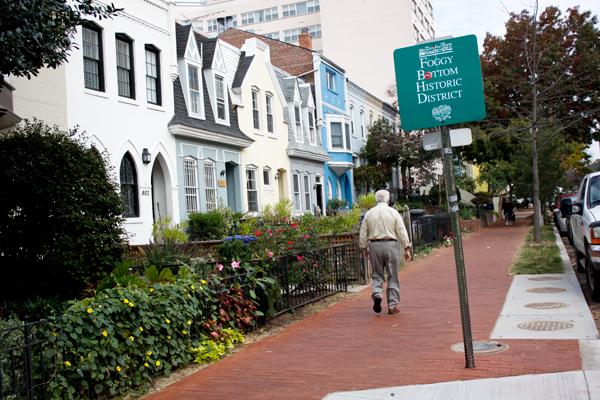When University President Steven Knapp stepped into a meeting at a Foggy Bottom resident’s house earlier this month, he was handed records of more than 100 complaints of noise and rowdy parties off campus.

Knapp had been invited into the nearby home of one of the founding members of the Foggy Bottom Residential Alliance. The organization, now one of three neighborhood groups, formed this semester to put pressure on GW after an uptick in complaints about late-night noise and overflowing trash cans on sidewalks.
Marina Streznewski, who has lived in the neighborhood for over a decade and organized the meeting with Knapp, declined to provide details of the private conversation but said about 15 Foggy Bottom residents were at the meeting.
As the neighbors handed over the several months of records, they claimed that the University never took action on the reports, according to a report of the meeting which was sent on a community email listserv by longtime resident Kenneth Durham.
Neighbors urged Knapp to send GW representatives off campus to see the behavior for themselves or to confirm the reports with other nearby residents.
“A resident disturbed by late-night noise could invite the University representative into his or her home to actually hear the noise,” the neighbors suggested, according to a report of the meeting sent over a community listserv.
Streznewski and Durham, along with other longtime residents, have spent years pushing the University to crack down on student behavior off campus as tensions between students and neighbors have peaked in recent months.
“It’s very frustrating because we’ve talked and talked and I’ve had many conversations with students. It seems there is a fundamental lack of understanding,” Streznewski said earlier this month.
Knapp told the neighbors he was concerned by the students’ behavior and pledged stricter consequences – such as fines and community service – for students who break the policy, according to the report.
He also agreed to impose sanctions after students are caught breaking the policy twice instead of after three or four incidents, the report reads.
Knapp declined to comment on policy proposals, but said in a statement Wednesday that he is committed to have a better working relationship with Foggy Bottom residents.
“A top priority of my administration from the start has been the building of strong relationships with all our neighbors – including neighboring institutions as well as residents,” Knapp said in the statement.
Britany Waddell, director of community relations, declined to comment on the bevy of neighbor proposals. She also declined to comment on what the fee structure or the escalating sanctions would be.
“By soliciting input from neighbors and university community members, the University is currently discussing ways to address neighbors’ concerns through a variety of possible avenues. It’s too early to discuss specifics as policies are still being developed,” Waddell said.
The neighbors’ request came a week before GW officials reintroduced a proposal to extend the power of University Police Department officers beyond campus boundaries.
The idea, which fizzled out this fall after it failed to gain momentum and was slammed by students, would allow UPD officers to enforce the code of conduct off campus and could smooth the relationship between students and neighbors.
Earlier this month, Streznewski said neighbors have called on GW to verify off-campus noise violations, but said letting UPD roam off campus may not be the right solution to the tension.
“We’re not sure UPD is the right way to go,” Streznewski said then.
To see legislation move through the D.C. Council, the University would need support from other local colleges, though many neighboring schools already have systems in place to monitor students living off campus. At Georgetown University, staff members will knock on students’ doors if neighbors call the campus hotline about late-night noise.
Neighbors pitched that idea to Knapp, who they said promised to look into the policy.
Georgetown’s chief of public safety Jay Gruber said allowing administrators to check if students are violating the school’s code of conduct works well. He added he would also like campus police to have the authority to respond to violations off campus.
“The efforts have proven to be very effective,” he said, calling neighbors partners in the university’s efforts.
Colleen Murphy and Rachael Gerendasy contributed reporting
This post was updated April 25, 2014 to reflect the following:
Correction appended
The Hatchet incorrectly reported that meetings between University President Steven Knapp and neighbors in Foggy Bottom was “rare.” Knapp last attended a West End Citizens’ Association meeting in February, according to University spokesman Kurtis Hiatt.







